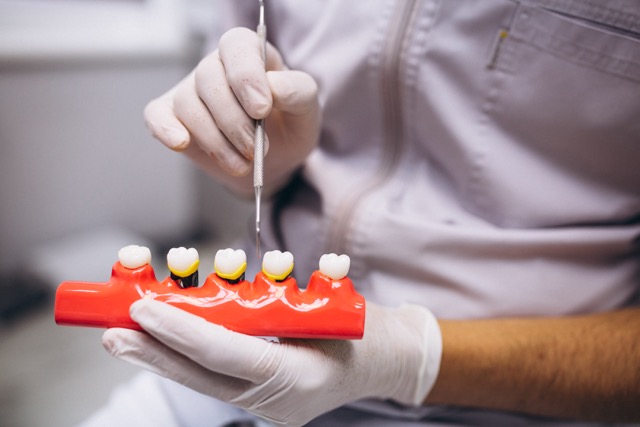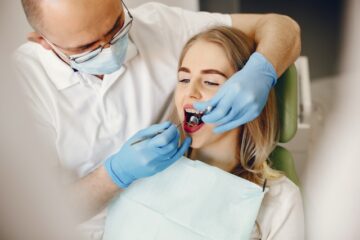Preventive Dentistry: What Is It and Why Does It Important?

Contents

Everything has its root causes. There’s no smoke without fire. Tides wouldn’t exist without the gravitational pull of the Moon and the Sun. And deep cavities wouldn’t develop if people didn’t neglect preventive treatment and oral care.
To avoid dental problems of various scales, preventive dentistry exists. This field encompasses services aimed at preventing dental issues. It includes various preventive measures and treatments offered by dentists. Dental insurance policies often cover preventive care for dental health. Let’s delve into the details.
What is Preventive Dental Care?
Preventive dental care is a set of professional services aimed at preventing and early diagnosing diseases of the teeth and gums. These techniques allow for comprehensive dental health care, addressing the needs that cannot be fully met by at-home oral care procedures alone.
All of this is necessary to prevent or minimize issues related to the health of teeth and gums. For instance, identifying and treating superficial cavities that have only affected the outer layer of enamel is much simpler and beneficial for the tooth’s health compared to treating deep cavities and performing root canals treatment. This is not to mention the cost implications and insurance coverage for the treatment of more advanced dental issues.
List of most common preventive dental services
Broadly, all preventive dentistry methods can be categorized into at-home care techniques and professional services. At-home care involves the daily routine of oral hygiene and tooth care. Professional preventive care comprises dental procedures conducted either on a one-time or periodic basis.
Home prevention includes:
- Daily tooth brushing: Recommended at least twice a day – in the morning and evening.
- Use of dental floss: This is care not only for the health of the teeth but also for the health of the gums.
- Daily use of mouthwash: Mouthwashes with high efficiency eliminate microbes and bacteria that contribute to the development of cavities.
- Consumption of fiber-rich food
- Minimal intake of sweet, acidic food: This promotes cavity development and damages enamel.
Preventive dental services that may be beneficial to you
Let’s explore the key services offered by dental clinics that will help you maintain control over your dental health. These services not only aid in preventing the development of dental and oral diseases but also allow for the early detection of any issues. This early identification enables prompt initiation of treatment, minimizing potential damage to the health of your teeth and gums.
Preventive Check-Up
Regularly visiting the dentist is often said to be the key to a flawless smile. But do you actually adhere to this rule? With hundreds of tasks a day, a busy schedule from morning to night, hobbies, and other commitments, finding time for a dental visit may not always be easy. However, your health should be your priority. Take care of it!
Visit the dentist for preventive check-ups every 6-12 months. There’s nothing to fear about it. During the visit, the dentist will conduct a visual examination of your oral cavity and can diagnose issues like surface cavities, dental plaque, gum diseases, and other disorders. If any issues are identified, the dentist will recommend a further treatment plan.
Teeth Cleaning
Daily at-home teeth cleaning doesn’t achieve 100% effectiveness in removing plaque. In such cases, preventive professional oral hygiene comes to the rescue. A dental hygienist meticulously cleans the perimeter of each tooth, including any hardened plaque, preventing the development of cavities. Additionally, they remove plaque in the sub-gingival area, promoting not only dental health but also gum health, preventing inflammation.
And that’s not all. Thorough professional cleaning can lighten the enamel color by several shades. So, in addition to preventive care, you also get a nice bonus for the aesthetics of your smile. Schedule preventive cleanings every 6-12 months and take care of the beauty and health of your smile.
X-ray or Panoramic Dental Imaging
When everything seems fine externally with a tooth, but you experience pain while chewing, consuming hot or cold food, or you want to ensure a tooth is healthy after accidental trauma, dental diagnostic imaging comes to the rescue.
A pinpoint X-ray of a single tooth or a panoramic dental image are preventive dentistry services that help identify “hidden” dental problems not visible to the naked eye. These methods also reveal the position of yet unerupted teeth and wisdom teeth, determine their alignment in the dental arch, and plan further treatment if there are threats to dental health.
Typically, dentists recommend such services when there are complaints and symptoms.
Fluoride Treatment
Another preventive service aimed at strengthening tooth enamel, often applied during childhood and less frequently in adults. The method involves carefully applying fluoride-containing agents to the tooth enamel. It is typically recommended in cases of fluoride deficiency in the body, which can manifest as dull enamel color and brown spots on its surface. The application of fluoride-containing solutions helps strengthen enamel and prevents its deterioration.
Dental Fissure Sealants
Fissures are small bumps and irregularities on the top of teeth, between which there are small grooves. It is thanks to these fissures that teeth perform their chewing function effectively. However, there’s one caveat. Food particles often get trapped in these grooves, making them challenging to remove even with a good toothbrush. As a result, dental plaque forms, followed by the development of cavities.
To prevent this, in some cases, dentists recommend fissure sealants. In this procedure, the top “bumpy” surfaces of teeth, especially the chewing surfaces, are coated with a special material that fills these grooves and hardens. This process helps prevent the development of cavities.
Benefits of Preventive Dental Care
When discussing the main positive aspects of preventive dentistry, it’s worth highlighting four key advantages:
- Prevention of Dental and Gum Diseases: Thorough professional dental care, combined with at-home care, helps prevent many dental diseases.
- Early Detection of Diseases and Disorders: If an issue exists, you will be aware of it at an early stage. A dentist can then help plan further treatment.
- Minimization of Risks to Dental Health: It’s easier to address a small problem quickly than to deal with its consequences on a larger scale.
- Minimization of Dental Treatment Costs: Prevention and early treatment are always more cost-effective.
Do Dental Insurance Plans Typically Include Coverage for Preventive Dental Services?
Absolutely! And usually with 100% coverage. Firstly, systemic preventive check-ups and examinations are fundamental services necessary for everyone. They are essential for individuals prone to dental and oral diseases as well as those with good genetic predispositions.
You come for an appointment, the dentist examines your oral cavity, performs a teeth cleaning, and you leave with a healthy smile or they recommend a further treatment plan if there are issues. Secondly, the thing is that any disease, including oral health issues, is best (and cheaper) prevented rather than treated. For this reason, many insurance policies fully cover preventive dentistry services.
Why is preventive treatment advantageous for both insurance companies and patients? It’s quite simple. Any preventive treatment is much cheaper than addressing advanced dental issues.
These are basic services that help patients timely detect or even prevent a problem and address it in its early stages. As for patients, the opportunity for early diagnosis of issues and prevention allows them to maintain dental and oral health for a longer time without undergoing painful and unpleasant procedures.
To find out whether your health insurance covers preventive dental services, inquire with your insurance company or refer to the details provided in your insurance policy.
And finally, don’t neglect professional preventive oral care. It is preventive methods that allow you to maintain the health and beauty of your smile for many years.
Preventive Dentistry: the Most Common Questions
What is the goal of preventive dentistry?
The primary goal of any preventive dentistry method is to prevent the onset of dental and gum diseases or detect them at the earliest stages, enabling immediate action to address the issue.
What is considered preventive care for dental?
Preventive dental care includes systemic check-ups by a dentist, hygienic teeth cleaning, dental X-rays, teeth fluoridation, fissure sealing, as well as dental consultations on oral care practices at home.
How early does comprehensive preventive dental care begin?
Start right now. Schedule a regular check-up with a dentist (especially if you haven’t seen one in the last 6 months). Based on the visual diagnosis of your oral cavity, the dentist can recommend specific preventive methods that will be relevant in your case.
Additional Resources
Global oral health status report: towards universal health coverage for oral health by 2030: regional summary of the Region of the Americas – World Health Organization
Oral health – an indispensable part of overall health and well-being – World Health Organization













